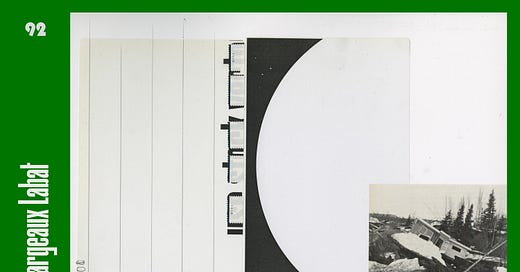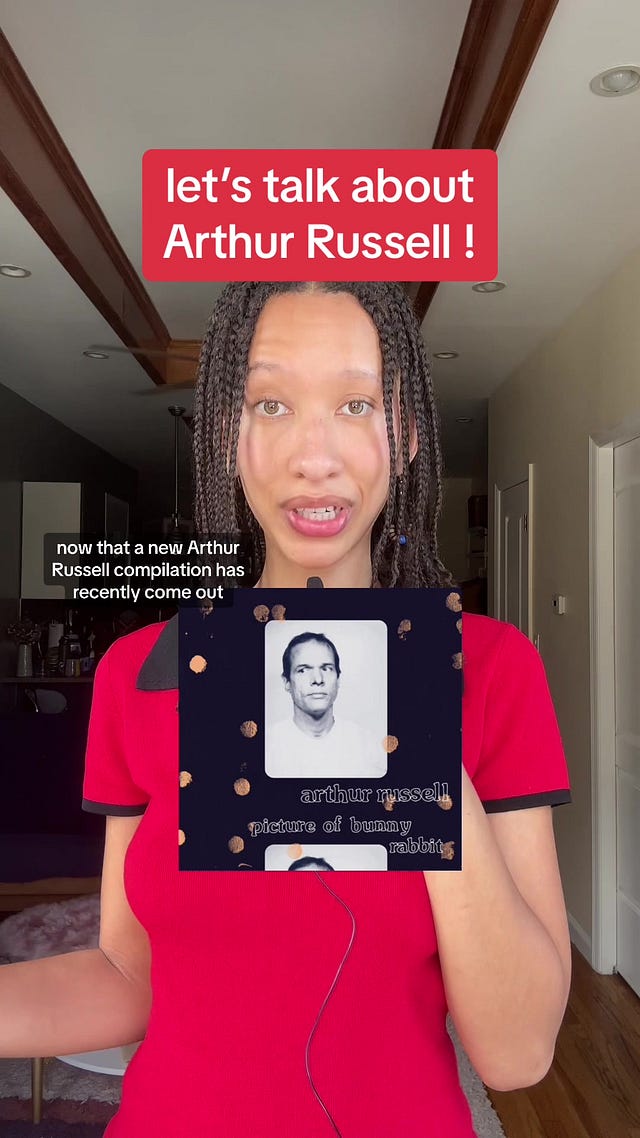Herb Sundays 92: Margeaux Labat
The generous Brooklyn-based music recommender shares her "ideal Sunday morning mix." [Season 5 finale]
Herb Sundays 92: Margeaux Labat (Apple, Spotify, Tidal). Season 5 finale. Art by Michael Cina.
Quick editor’s note: Welcome new subscribers. I write these Herb editions as “seasons” as a way of giving them some shape and a short downtime. I want to give my limited writing time to a few other projects in the next month but will inevitably post some stuff here and there. Shout out to my visual collaborator Michael Cina (go read his Substack) for keeping pace and continuing the climb. Keep up on Herb stuff on IG, Twitter, or just reply to these if you ever want to share some feedback for the curators, etc. Back to the music…
"This is my ideal Sunday morning mix - what I listen to when I wanna ease into my day, but still experience a variety of sounds and genres. A good handful of these songs feel very personal to me, serving as the soundtrack to Sunday mornings throughout my formative years, one even being a song that my mom would play for my brothers and me when we were small. While this selection is close to my heart, I'm happy to share it with others, since sharing music is, to me, the ultimate gift." - Margeaux Labat
Margeaux Labat is a music recommender (my word, if it is a word) and curator based in Brooklyn. She posts videos about her music discoveries/passions on TikTok and Instagram under the handle @marg.mp3, as well as long-form artist interviews (Kate NV, etc.) on her YouTube channel. She also holds down an excellent NTS radio show and is a member of the Pitchfork video team.
In June’s Herb Sundays 87 on Australia’s Derrick Gee (what I’m calling the Influencer Edition), I dropped a little in about Margeaux after many of you told me she’s one of the best doing this new brand of music recommendation. I ran into her at a show recently and realized that it was only right that I pass her the Herb-encrusted aux and let it fly, as she’s one of the most compelling voices in video-based music sharing.
Margeaux has a real knack for the textural side of soft tunes, which is on display here and she worked up an incredible mix from her past and personal life. Her range of tastes, which carries a strong international component, means she can give very powerful recommendations that won’t scare away newcomers either. I loved some of the lesser-known cuts/versions from major names (Marley, Simon, Pumpkins), and some herbal delights from all-timers like Sam Prekop made into a complete whole. I couldn’t ask for a better way to close this season, which started from a snowy Colorado pizza shop parking lot back in January. Herb 92 also has that great happysad thing going for it which pairs well with um, August and such.
The dissatisfaction with the way social media has turned out in its coming-of-age era is fair game, but it’s risky to throw the whole thing out, as it’s inarguable that’s where people will likely be for a long while. We as users probably just need to do a better job of being as intentional as we are with music or TV now and scroll less, set time limits, unfollow our college friends, etc. Why would you “channel surf” in 2023 unless you want to be made sad? Unless you like that sort of thing.
Back to Herb 87, here’s me: “There has been a growing desire for more journalistic depth in recent years, often finding its way into expanded liner notes, an old-world standard that reissue labels have upheld. A deeper version of this in audio form was found in the Song Exploder podcast (by Herb 52 Hrishikesh Hirway) and the like… The throughline of older siblings, radio DJs, record store clerks, club DJs, magazines, music supervisors, blogs/substacks/discords have acted as a taste network that still is hard to beat and all helped really push my taste and maybe posts with Derrick Gee’s conversational tone feel like an equivalent for young fans.”
If all platforms have a tone/purpose in their early days, you could argue that Substack runs on recommendation culture, if we’re looking at the blockbuster stacks like Jonah Weiner (Herb 77) and Erin Wylie’s Blackbird Spyplane and Perfectly Imperfect which are both basically mini magazines but with lots of one-to-one voice. In this past week’s PI edition, the recommender, Matthew Donovan, pulls a meta move and recommends recommending itself:
Culture Aggregators (like Perfectly Imperfect!)
Ah, 'Perfectly Imperfect', and other projects that curate, gather, connect, or map out various cultural endeavors, are meaningful resources in this overwhelming era of information…Do community and culture or whatever, let the culture, not the clout, be your compass, and who knows? You could be a part of something that makes the world a smidgen less vile, a tad less melancholic. Admittedly, I'm not sure how you should do it because it should tailored to your interests, start small, and cherish wherever it is. as or if it grows You may even make a few folks few special or more sane in the process but in focusing on community project you are likely to be the one most transformed by it.
Like Donovan, I’m not saying everyone needs to start a Substack to be able to do this, it can just be in the company Slack, but sharing from a place of passion, in public, tends to be a great way to build relationships.
More dramatically one could argue recommending is a refusal of the continued minimization of fringe or emerging culture as ideally, not all great ideas and such are siloed and held privately. This move may actually be critical, as we continue to lose physical and digital column inches in major publications and weekly city papers which is a major issue for the culture world in my estimation.
As the great music writer/community builder Piotr Orlov (Herb 54) recently put it in his excellent NYC-centric Dada Strain Substack:
“Of course, the continued decimation of such “starter” coverage — the place where new, undiscovered and growing artists, or community events, could grab a toe-hold in a mainstream publication — was simply more of the same from local New York media institutions. Many of them are based in the city, but either have their eye on a national and global audiences, or serve a populace devoted to a moneyed arts culture, which is driven by the intersection of corporate interests and establishment spaces.”
I can speak from experience that Ghostly’s public growth came thanks to coverage in weeklies like the Detroit Metro Times, Real Detroit Weekly, the Village Voice, and even the occasional blip in the New Yorker from keen writers like Michaelangelo Matos who wrote about his (and others) dismissal from the New Yorker’s crucial Goings on About Town this week in his Beat Connection substack.
“Goings On About Town gave me the best perch imaginable—I got to highlight something good, something of my choosing, that was happening at the clubs of the world’s biggest city nearly every week. I got to write about DJs for a general audience and I got to use three-dollar words. The sentences had to be complete thoughts and I wasn’t allowed to use unexplained jargon. Metaphors had to survive the copy department’s stare-downs, not to mention those of the editors.”
I don’t have a hot take on fixing ad-based publishing, or even social media, but railing against the owners of these platforms isn’t likely to make a dent in what we are served. It’s imperative that we as individual fans/users help raise and support a new generation (as well as the older guard) of writers, recommenders, and yes, even public intellectuals, who can guide us through the morass.
Back to Orlov…
Historically, this “next” is a product of communities, not big companies and platforms. And while many such platforms are undoubtedly creating versions of “community” online — both good and bad — it is the act of getting dirty and into the trenches together, and acting on your shared intuition for an extended period of time, that formulates the big ideas which withstand the critical kicking of the creative tires.








